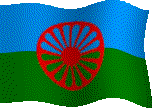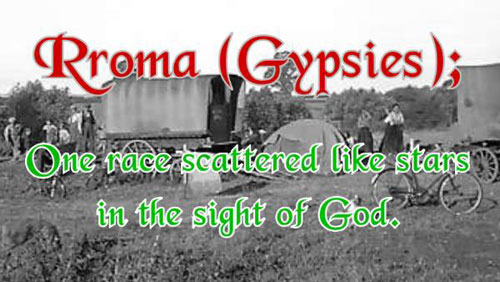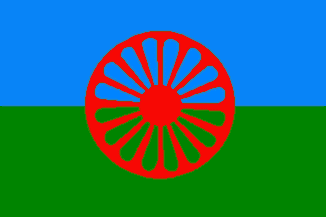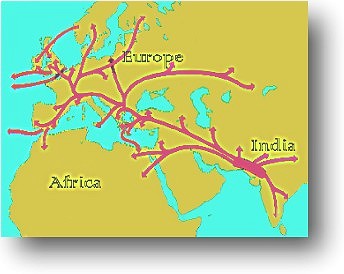| |
|
| |
To many of us the term Gypsy congers a romantic image of spiritual travellers
quietly moving from town to town, across lush green countryside in brightly
decorated vardo's. We imagine campfires surrounded by music and dance,
and many happy children. We imagine town's people seeking spiritual guidance
from the 'Gypsy Fortune Tellers' and natural healing therapies, and we
even hold romantic notions of being 'conned' by the worldly Gypsies.
|
| |
Sadly, the reality of the life of many Gypsies
or Rroma, which is the correct terminology, is very different from our romantic
image. The term Gypsy is regarded as an insult and offensive to many Romani
people. The reality for many Romani people or Rroma today is life in internment
and refugee camps, because even in the twenty first century, and after more
than a millennia or persecution, Europe's nomads, the Romani people remain
unwelcome and unwanted. |
| |
It would seem that Europe, even with the easing
of national borders remains too small to accommodate the Rroma. |
| |
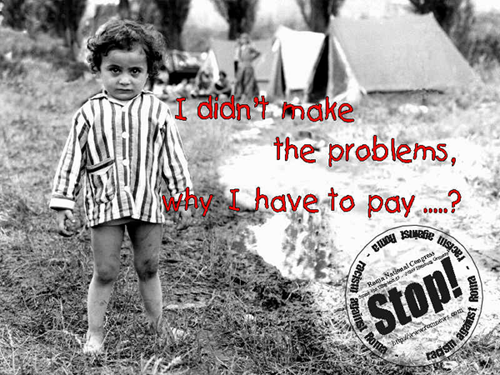 |
| |
Following the move into Europe hundreds of years ago, many Romani have
settled down and moved into society, inter-marrying with Europeans, and
losing their cultural identity in the process. However, Romani blood courses
strong in the veins of some Europeans of Romani descent. I cannot say
why some Europeans of Romani descent feel the call of the road, nor can
I say why not all Europeans of Romani descent feel the call of the road.
However, I feel the call of the road, and I have cousins who feel the
call of the road, but many in my family are content to settle down.
|
| |
I have long known that I was of Romani decent,
and I have always felt the call of the road, having began wondering off
by myself from the age of three. However, for most of my life I did not
understand why I was unable to become settled, and I did not understand
why I have only been able to remain settled for a period of time before
being drawn to move on in some form or another. Occasionally I have needed
to ride the call of the road out, but the call of the road has always returned
until I answered the call. |
| |
That the Romani blood is strong in my veins, and that I can easily and
without second thought travel across the world, alone and without notice
is essential for my role and my task.
|
| |
However, this page is not about me or my task.
This page exists because I am drawn to use this website to assist to raise
the awareness of the world to the truth in respect to those of Romani decent,
for a variety of reasons. |
| |
Tsúnyöta Köhe't |
| |
Gypsies-By Any Other Name.
|
| |
As a result of centuries of hatred, racism and persecution, the term
Gypsy is to many Rroma derogatory, and offensive. Europeans incorrectly
believed that the Rroma had their origin in Egypt, and derived the term
Gypsy.
|
| |
The Romani people, are called by many names such
as Cigano, Gypsies, Gipsies, Rom, Roma, Romani, Tsigani, Tzigane, Zigeuner,
and others. Most Roma identify themselves either by their tribal name or
by one of the names beginning with the prefix "Rom". Frequently, a prefix
with a double "R" is used, as in "Rrom". The Council of Europe has approved
the use of "Rroma (Gypsies)" in its official documents. |
| |
The Rroma Flag.
|
| |
There is no universal written Romani language
in use by all Rroma. However, the codification of a constructed, standardized
dialect is currently in progress by members of the Linguistic Commission
of the International Romani Union. |
| |
There are four Rom "tribes", or nations (natsiya), of Rroma:
the Kalderash, the Machavaya, the Lovari, and the Churari. Other groups
include the Romanichal, the Gitanoes (Calé), the Sinti, the Rudari, the
Manush, the Boyash, the Ungaritza, the Luri, the Bashaldé, the Romungro,
and the Xoraxai. The first European descriptions of the Roma upon their
entering Europe emphasized their dark skin and black hair. Through integration
with Europeans over the centuries, Rroma today can also be found with
light skin and hair.
|
| |
Romani culture is diverse and there is no universal
culture per se, but there are attributes common to all Rroma: loyalty to
family (extended and clan); belief in Del (God) and beng (the Devil); belief
in predestiny; Romaniya, standards and norms, varying in degree from tribe
to tribe; and adaptability to changing conditions. Integration of many Rroma
into gajikané (non-Rroma, or foreign) culture due to settlement has diluted
many Romani cultural values and beliefs. Not all tribes have the same definition
of who and what is "Rroma." What may be accepted as "true-Rroma" by one
group may be gadjé to another. Romani culture is diverse, with many traditions
and customs, and all tribes around the world have their own individual beliefs
and tenets. It would be invalid to generalize and oversimplify by giving
concrete rules to all Rroma. Despite what some groups may believe, there
is no one tribe that can call themselves the one, "true" Rroma. |
| |
There have been many large-scale, state-sponsored persecutions, or pogroms,
against the Roma throughout European history. The Nazi terror of World
War II is the most infamous and is responsible for the deaths of up to
1.5 million Roma in the Porrajmos (Holocaust). The recent collapse of
the communist governments of Eastern Europe have rekindled anti-Rroma
sentiment in Eastern and Western Europe. Violent attacks against Romani
immigrants and refugees have been permitted to occur with little or no
restraint from government authorities. The Romani people remain the least
integrated and the most persecuted people of Europe. Almost everywhere,
their fundamental civil rights are threatened. Racist violence targeting
Rroma is on the rise after the fall of Communism. Discrimination against
Rroma in employment, education, health care, administrative and other
services is observed in most societies, and hate speech against them deepens
the negative anti-Rroma stereotypes which are typical of European public
opinion.
|
| |
Anti-Rroma attitudes also exist in the Americas
to one extent or another. Misrepresentations of the Romani people in the
popular press, books, films and television have contributed to negative
stereotypes and characterisations. Special "Gypsy" units in some
local police forces exist to warn the gadje population of "Gypsy"
activities. |
| |
In the last few years, the Rroma issue has been addressed by various
non-governmental organisations, national as well as international. Different
approaches - economic, social, political, cultural, and others - have
been applied in the hope of improving the living standards of the Rroma,
of promoting a more just social policy, of strengthening Rroma cultural
identity, or of encouraging Rroma political participation. Solutions have
been sought in the context of the struggle against racism and nationalism,
as well as in the context of enhancing cultural pluralism. These recent
projects are fragments of a growing all-European Rroma movement that is
now only in its formative stage. The shape of this movement is still amorphous
and incomplete. There still exists no significant internationalised human
rights strategy initiative to monitor the human rights situation of the
Rroma and to provide legal defence in cases of human rights abuse.
|
